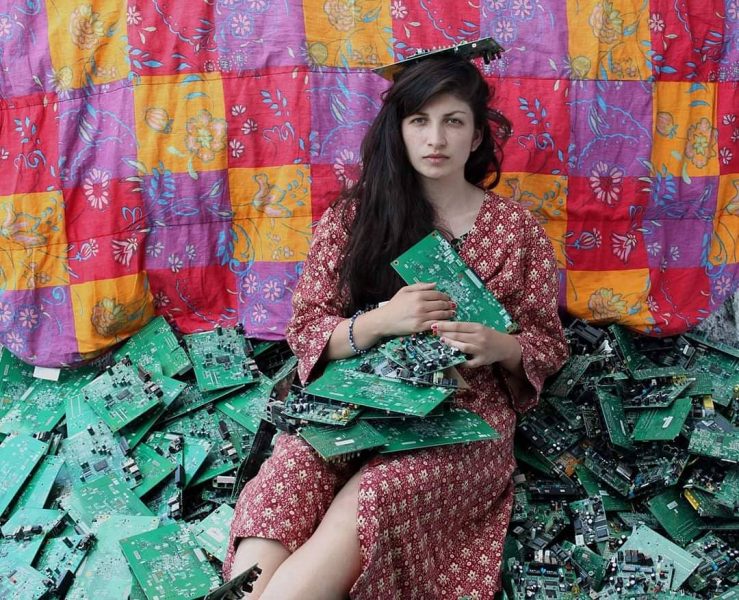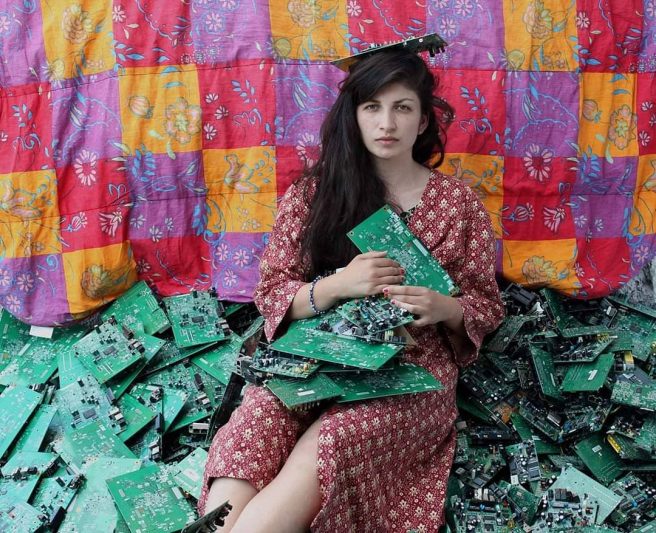Selma Selman is a Roma woman from Bosnia and Herzegovina. She incorporates her creativity, but also identity aspects into her artwork. Being part of a family that earns their living from collecting and selling iron, Selma uses iron and reusable materials in her art. In her show Mercedes Matrix breaks a Mercedes car with the help of her family in front of an audience in order to question labour and capitalism in Roma settings and beyond. The Selman family wrote “Selma Selman is Tito” – referring to the Yugoslav leader – on their family van to point out the solidarity spirit and power she brings to their village. Selma owns Selma Selman studio in Bosnia and helps young Roma girls to obtain necessary education through her foundation.
Selman says that as a Roma woman she has been targeted by a lot of hate speech. Selman’s approach to combating hate is to ignore it to the point when haters become conscious of their own unhappiness.
This episode of the podcast “Young and Diverse” is created in cooperation with the podcast Celebrate Life and local artist from North Macedonia, Goran Kostovski- Indog. You can listen to the full episode below.

This pandemic has changed the world. Marginalized communities have been ignored. Kids were not able to attend school because of the lack of computers. Recently you made your own studio and with your last project “Get the Hack to School“you did a lot for the local community. Can you tell more about this project?
Thinking about the pandemic makes me think about the situation of Roma people, before and now. And the reality is that Roma people were always in a trouble, even before the pandemic, but now it is even worse. There was never a good situation where Roma people could live normally and with the pandemic it is much worse.
And in regards to that I realised that I have to create something; a cultural institution in my village because such a thing doesn’t exist there. I realised that I am going to open and build my studio as a place where everyone, not restricted to Roma, can come, borrow a book, borrow a laptop, ask for information they need. This is a place that serves for education and emancipation.
Talking about this, my project “Get the Hack to School” which started in 2017 is actually funding firstly girls with full scholarships. The reason why I am targeting girls is because I want all of these girls from my village to have elementary school [education]. This is somethings which I think is a human right for every child and for Roma girls. This foundation is not restricted only to Roma girls. I am also giving scholarships to boys. From 2017 to 2020 we were giving out school lunches, but because of the pandemic we had to stop this because it was not safe.
For now I can say that we did a lot of progress with this small help. (…)For example now we have one girl who enrolled into Law school, one girl is studying art school, 2 boys into high school and all other kids to primary school.
As much as this is beautiful to do at the same time is very hard for me. I have to serve as a [role] model. Being a [role] model means that you cannot fail. It means that you always must show them that education is the right way to have a normal and good life. At the same time you always have to have the trust from those girls that you wish the best to them. Since the Roma people were traumatised by the white people, where the white people were using them whether to get funds or some things from them, Roma people started to assume that even someone who is coming from their own community is also trying to abuse them. This is why this is a big challenge for me to gain the trust. I can say that I really have huge respect for my community and family.
In one interview for the Macedonian feminist festival Prvo pa Zensko (First Born Girl), you state that the Roma are the planet’s leading social, ecological and technological futurists. Roma people have been recycling for many years and earned a living from this, while the Western world only a few years ago started to become aware of recycling plastics as a benefit. How to overcome those narratives in the Balkans in which Roma are just perceived as collectors of plastics for their own survival- but often people miss to see the great ecological contribution they have with this job?
For many years, people who were collecting iron, scrap metal or plastic were perceived as people who were working undervalued labor. It was not interesting 100 years ago to collect this stuff, because people didn’t think about ecology so much. The funny and at the same time beautiful thing is that Roma people were unconscious that they were helping themselves, but also to the world.
You speak in many ways through your art as a Roma woman, you relate to your origins in Bosnia despite being famous worldwide, bringing close connections to how your family lives and works. In your exhibition Mercedes Matrix you question the concepts of labor, survival, economic struggles and daily living of Roma families. Can you elaborate on Mercedes Matrix exhibition?
To be honest my family really loves to participate in my show. They like that they can be paid more. The interesting part for the Mercedes Matrix show in 2019 was that this was the first time I did a public performance with my family.
Mercedes Matrix was the intro into collective performances with my family. They told me that when they do this performances with me it is totally different situation and circumstances in the art world. They said that when they usually do this work at home, breaking cars on a daily basis doesn’t represent anything more than a job that gives you money. And this job does not represent a value. You don’t get any value for this job. You are perceived as an iron picker and nothing else. But when they were transformed into these circumstances in the art world they felt proud of what they do. This was the first time for them that they have been recognized.
For many Balkan countries, the rule of “hate silence“ in the media applies to many community groups including the Roma community. In this case, hate is not expressed through the discourse or reporting, but through ignoring and staying silent. For what problems that concern the Roma community in the Balkans do the media stay silent?
The media has a big role [to play]. Any media, but especially social media. They have to be really conscious of what they do. I know from my personal experience. I get a lot of hate from white people. I am on all social media and all media in Bosnia. People like to interview me. I use the media and interviews in order to say something clever for them. I give interviews to those portals who are read by haters and those who are read by educated people. From those people who read those, I would say, “cheap“ portals and magazines you get a lot of hate. You can see how much time they have to actually share the hate. On one of my interviews I got 300 comments which are all about hate. The hate always existed and stereotypes based on anything. In order to fight that you show them how successful you can be and not react to their stupidity.
It is really easy to hate. Who are those people that decide on what someone else has to do and they instantly hate? Why do people hate?
It is a really great philosophical question. Why [do] people hate? At the same time why people love? It is the same. It is just like yin-yang. The darkness exists in the happiness and the happiness exists in the darkness. We need to find the balance and the balance is the hardest to achieve. People who hated you that means that they are not satisfied with themselves and the only way to feel a little bit happier is if they make you sad. We live in a world where many people are unhappy, because of the government, because of the salaries, because of the money, the law… I cannot even judge these people. The only way how to fight it is to just let it go. Then, they themselves will maybe die in hate or be unhappy all their life.
What would you recommend to the young people in the Balkans?
Maybe I can say something through me, what I have learned through all this experiences with traveling, working, troubles, living in underprivileged circumstances and making myself visible. The only thing which helped to build myself is that I never perceived myself [as being]different as people would call me. I always perceived [myself] normal and equal to others. I never perceived myself as not being able to do something. I always viewed that if I want something I can really do it regardless of how much time it is going to take, but it is going to happen. For me, I don’t believe in the hard work, but in the clever and smart work, making strategy and thinking about what I really want. Once you realize what you really want, you will realize that being proud on your national identity doesn’t make sense. Being proud of your country doesn’t make sense. Country is an invented terminology. I think that the only tactic for me to succeed is this normalization, that I am normal, no smarter than other, not more stupid than other, just me.
All of us who were born underprivileged, we all went through similar experiences of discrimination. The facts is that these forms of discrimination still exist today.
The only way to fight haters is [not feeling pity for] yourself and not showing them how vulnerable you are. It is the hardest thing to do. How do you stay calm when someone is bullying you? I didn’t have a lot of friends in elementary school. Even though I was white, I was still perceived as dirty and black in the school. Then I realized when I was getting the best grades, people started to perceive me as normal. This was my strategy.
Editor’s note: This is an edited version of Selma Selman’s interview. You can listen to the whole interview on Spotify’s Anchor. Some parts were edited for more clarity.
Photo credits: Selma Selman’s personal gallery. You can follow Selma Selman on Instagram at selman.selma

